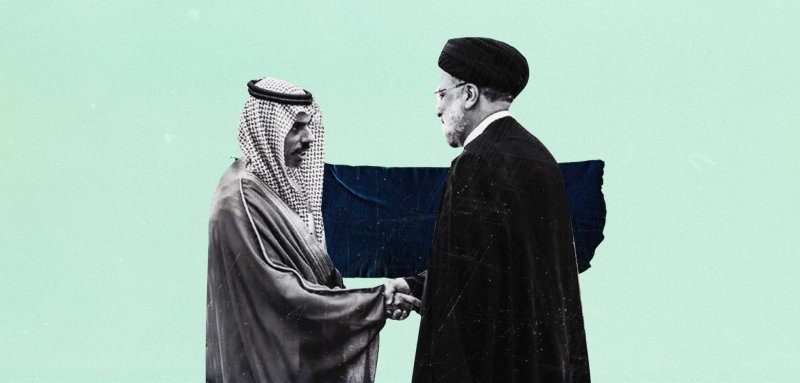In light of the positive dynamics the region is witnessing following the agreement between Iran and Saudi Arabia and the resumption of their diplomatic relations, the Iranian Foreign Minister visited four Gulf capitals: Doha, Muscat, Kuwait, and Abu Dhabi, in mid-June, marking the beginning of new relations between the neighbors.
Upon his return, Minister Hossein Amir-Abdollahian posted on his Instagram account, saying, "In line with the neighborly policy pursued by the 13th administration (President Ebrahim Raisi's government), shortly after hosting the Saudi Foreign Minister and the fruitful talks held in Tehran, I visited four countries: Qatar, Oman, Kuwait, and the Emirates."
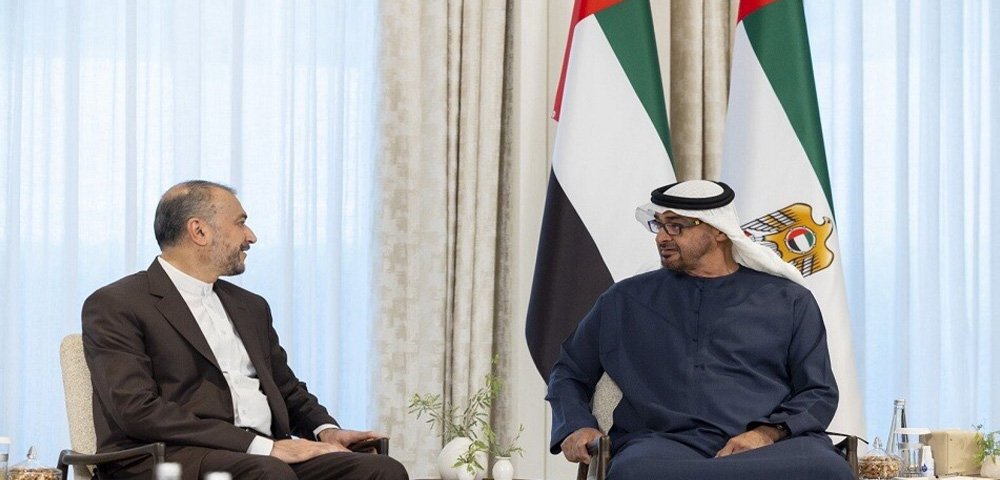
The minister continued, "Iran believes that putting in place a joint mechanism for dialog and cooperation with the participation of all littoral states of the strategic region of the Persian Gulf is necessary and fruitful more than ever before. To this end, while welcoming the initiative of the UN secretary general to hold a meeting of the top diplomats of regional countries in New York, we will put forth the idea of forming a 'forum of dialog and cooperation' with the presence of all the countries in the north and south of the Gulf and we will also present the details in writing in the near future."
The Gulf tour of the Iranian Foreign Minister comes after Iran expanded the umbrella of its diplomatic roles in the Gulf capitals, ranging from hosting to mediation.
The Gulf tour of the Iranian Foreign Minister comes after Iran expanded the umbrella of its diplomatic roles in the Gulf capitals, ranging from hosting to mediation. Just before Oman and Qatar hosted indirect talks between Iran and the United States, Abu Dhabi hosted a coordinating meeting between Tehran and the European capitals present in the nuclear agreement: London, Paris, and Berlin.
Prior to that, the Commander of the Iranian Navy, Shahram Irani, announced in an interview with Iranian television the establishment of a new maritime alliance composed of Iranian, Saudi, Iraqi, Emirati, and Qatari forces in the Gulf waters, and he explained that there had been a previous maritime coalition between Tehran and Muscat.
Since taking office in 2021, the conservative government headed by President Ebrahim Raisi has raised the slogan of developing relations with neighbors and emphasized the return of relations with neighboring countries, especially Arab ones. With Tehran hosting the Emir of Qatar and the Sultan of Oman, Raisi visited Doha and Muscat during the past two years. It also appears that he has another two important visits on his agenda: Riyadh and Abu Dhabi, which may take place this year.
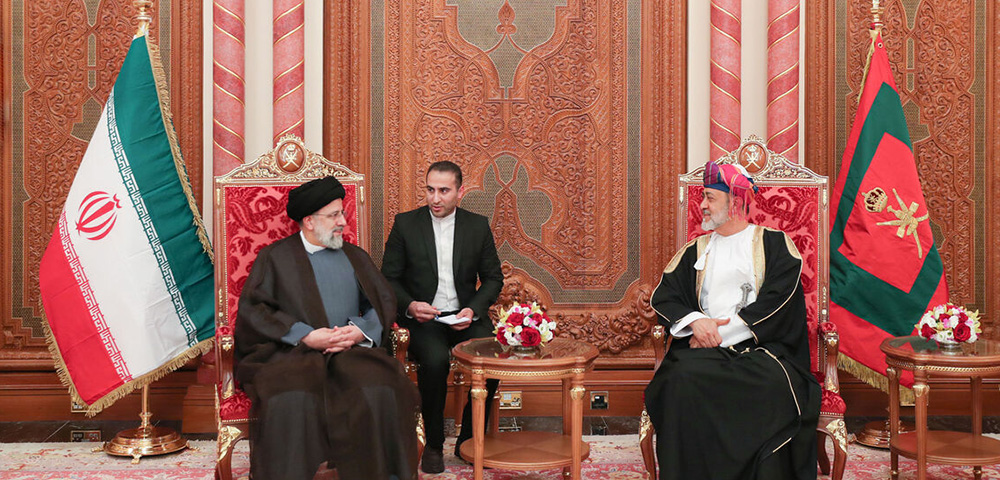
Everyone is looking to open a new chapter of relative calm in the region after it had experienced a cold war and proxy conflicts in multiple locations between Tehran and Gulf capitals. What leaders in the region are currently calling for is sustainable economic growth, which can only be achieved through a movement towards peace.
In this article, we will present the roots of Iranian-Gulf relations, which have entered a new phase of bilateral relations at present. These relations have helped reduce tension and develop diplomatic relations first, and they seem to be moving towards military and security relations, eventually expanding trade relations between these countries.
The struggle between Tehran and Riyadh over political legitimacy
The conflict between Tehran and Riyadh over political legitimacy began in the 1950s due to border delineation issues, especially those related to shared oil fields. Despite the suspicion felt by both ruling families in the two countries, this dispute did not escalate into cross-border tension because both were preoccupied with internal affairs.
After the British withdrew from the Gulf in 1968, relations between the two countries became more tense due to competition over leadership, control over OPEC, and security in the Gulf, and Riyadh was concerned about Tehran's strong relationship with the United States.
The dispute intensified over the islands of Abu Musa and Tunb in the Gulf. Then the problem of Bahrain erupted, which the Shah considered the 14th province of Iran, and the crisis ended with the independence of Manama.
However, the most significant milestone in the conflict was the victory of the Islamic Revolution in 1979 led by Ruhollah Khomeini, who promised to export the revolution to other countries. This call was quickly answered by the Shiites in the eastern region of the Kingdom when they rose up carrying pictures of Khomeini and slogans against the House of Saud.
Then in the 1980s, Iranian pilgrims staged demonstrations in Mecca, resulting in the deaths of 450 people. This prompted Iran to demand guardianship over the two holy sites, and Saudi Arabia responded by significantly reducing the number of its pilgrims.
Khomeini became the new hero of the Islamic nation with his revolutionary speeches against the West, posing a threat to the legitimacy of Gulf regimes. As a result, six Gulf countries decided to unite for the defense of their security by establishing the Gulf Cooperation Council.
Then came the Iraq-Iran War in 2003, during which Iran expanded its influence over the political elite and the new Iraqi government. After the Arab Spring, Tehran attempted to support the revolutionaries and backed Bahrain and Yemen, which was seen as a direct threat to Saudi national security and led Riyadh to get involved in a 9-year war in Yemen.
The conflict between Saudi Arabia and Iran branches out into several levels: political legitimacy, security, and the geopolitical context. Sectarian or ethnic differences are only used as a means to gain popular support.
The conflict continued with the execution of the Shia cleric Nimr al-Nimr on terrorism charges in 2016, which led to the attack on the Saudi embassy in Tehran and its subsequent burning. After a series of conflicts and proxy wars between the two countries, the parties returned to the negotiating table and toned down the conflict, which will have a positive impact on both capitals, alongside other Arab countries, such as Yemen, Lebanon, Syria, Iraq, and Bahrain, are also involved in the conflict.
The UAE, Iran's largest trading partner
The conflict between Abu Dhabi and Tehran can be summarized by the ownership of three islands: Abu Musa, Greater Tunb, and Lesser Tunb in the Gulf, which has been a source of dispute for the past fifty years.
After the Islamic Revolution, Khomeini became the new hero of the Islamic nation with his revolutionary speeches against the West, posing a threat to the legitimacy of Gulf regimes. As a result, six Gulf countries decided to form the GCC for their security
After the attack on the Saudi embassy in 2016, the United Arab Emirates reduced its diplomatic presence in Tehran in support of Riyadh. The Iranian-backed Houthis also targeted UAE ports multiple times in 2020, leading to increased media tensions between the two sides. The UAE's Mohammed bin Zayed decided to normalize relations with Israel, which Iran condemned as a threat to regional security.
However, diplomatic relations between the two neighbors were restored, and the Abu Dhabi ambassador to Tehran resumed his duties in 2022. Despite their differences, Abu Dhabi did not sever its trade relations with Tehran, and the trade volume reached around 22 billion dollars. The UAE is Iran's largest trading partner, and approximately half a million Iranians live in the Emirates.
Bahrain, a sectarian issue
The majority of Bahrain's population is Shia while the ruling family belongs to the Sunni sect. Tehran officially claimed that Bahrain is part of its territory until the Shah relinquished his claim in exchange for control over the disputed islands with the UAE. Manama gained independence in 1970 through a UN-sponsored referendum.
When the Bahraini uprising against the ruling Al Khalifa family erupted in 2011, Tehran supported the Shiite protesters and called for the king to step down based on the public's demands, further fueling the dispute between the two countries.
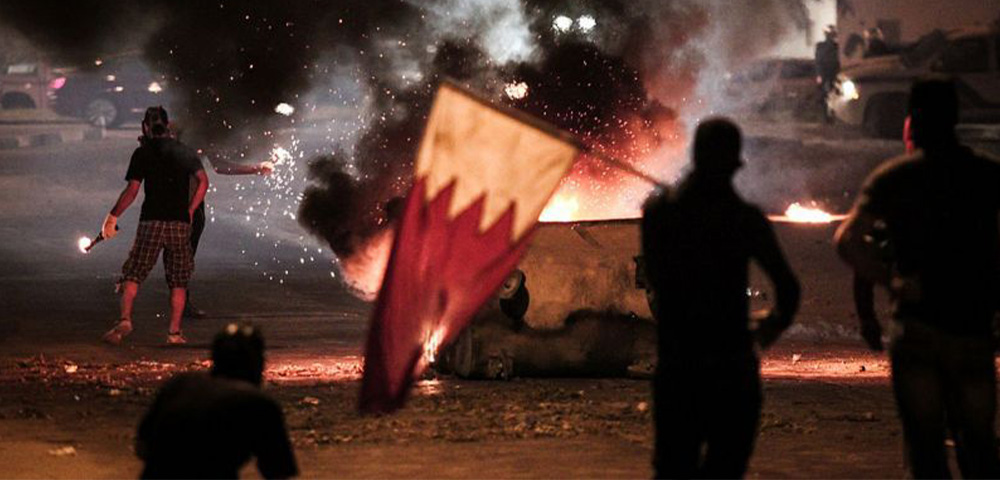
When Saudi Arabia severed its relations with the Islamic Republic due to the embassy burning incident in 2016, Bahrain also cut its ties. It exiled many of the protesters who sought refuge in Tehran, including the Shia cleric Isa Qassim.
In September 2020, Bahrain moved towards normalizing relations with Israel, signing several agreements with Tel Aviv and hosting their leaders in Manama. Tehran protested against this and threatened Bahrain with consequences.
Manama welcomed the restoration of relations between Riyadh and Tehran. It also hosted an Iranian parliamentary delegation, which met with the speaker of the Bahraini Parliament. There has been reports of negotiations mediated by another country to restore diplomatic relations, reopen embassies, and resume flights between the two countries, allowing Bahrain residents to visit Shia holy sites in Iran.
Kuwait, calm and quiet relations
Tehran welcomed Kuwait's independence in June 1961 and opened its embassy in Tehran in the winter of 1962. Like other Gulf states, Kuwait's relationship with Iran was influenced by Saudi-Iranian relations.
After the Islamic Revolution succeeded in Iran in 1979, Kuwait feared the impact of the revolution on its population and severed ties with Tehran, supporting Saddam Hussein in his war against Iran. Afterwards, Kuwait renewed its relations in the 1990s and Iran was the first country to denounce the Iraqi invasion of Kuwait, calling for its end.
Everyone is looking to open a new chapter of relative calm in the region after it had experienced a cold war and proxy conflicts in multiple areas between Tehran and Gulf states. Leaders in the region are calling for sustainable economic growth through peace
Despite the relatively low tensions in bilateral relations, Kuwait then went on to reduce its diplomatic representation in Tehran after the Saudi embassy incident in 2016, and demanded that Tehran reduce the number of its diplomats in Kuwait.
The ambassadors then returned to both capitals in 2022, and the joint consular committee between Iran and Kuwait was held after about a 7-year hiatus. It discussed the issuance of visas for Iranian citizens, issues related to the Iranian community in Kuwait, as well as matters concerning commercial barges and ships.
Iranian Foreign Minister Amir-Abdollahian visited Kuwait last month (June 21, 2023) and met with Kuwaiti Prime Minister Sheikh Ahmad Nawaf Al-Ahmad Al-Jaber Al-Sabah. After the latter welcomed Tehran's efforts to develop relations with Arab countries, he stated, "The presence of 30,000 Iranian citizens in Kuwait is an opportunity for bilateral relations between the two countries and a policy of good neighborliness."
Oman, a model of relations
The importance of strategic relations between Iran and the Sultanate of Oman lies in the presence of the Strait of Hormuz between them, a natural channel connecting the Gulf to the Indian Ocean. Iran is located to its north, while Oman is to its south, with a maritime distance of 21 nautical miles between the two countries.
The relationship between royal Iran under Shah Mohammad Reza Pahlavi and modern Oman under the leadership of Sultan Qaboos began when the latter took power in 1970. Sultan Qaboos requested the resumption of relations between the two states, which the Shah welcomed, and the countries exchanged ambassadors.
Qaboos asked the Shah to aid him in the Omani civil war, aka the Dhofar Rebellion, in 1972, and the Shah accepted. The Iranian army participated with about 4,000 officers and dozens of air and ground equipment in Salalah, and the Iranian forces remained in Oman even after the end of the war, until they fully withdrew after the victory of the Islamic Revolution in Iran in 1979.
With the cessation of relations between Iran and the West over the nuclear file, support for Moscow against Ukraine, and the missile program, it seems Iran has turned to growing relations with its neighbors to ease the economic sanctions draining the country
After the establishment of the Islamic Republic government, Oman continued its relations with the new regime. Muscat even hosted both sides of the conflict in the Iran-Iraq War in the 1980s in order to conduct secret talks for a ceasefire. The mediation did not succeed, but Oman's policies towards Iran persisted. After the First Gulf War, Oman hosted a second mediation effort to restore relations between Saudi Arabia and Iran, as well as between Tehran and London. Oman's role as a safe and trusted mediator between Tehran and the West, as well as between Tehran and the Arab world, has continued until now.
Tehran supports Doha in breaking the blockade
Iran was one of the first countries to recognize Qatar's independence in 1971. Qatar and Iran signed an agreement to demarcate their maritime borders. After Qatar supported Baghdad in its war against Tehran, former Qatari Emir Hamad bin Khalifa welcomed Iran's participation in the Gulf's security arrangements after the end of the Kuwait invasion, but the Gulf states rejected it. However, the Qatari intelligence agency maintained security and intelligence cooperation with Iranian intelligence.
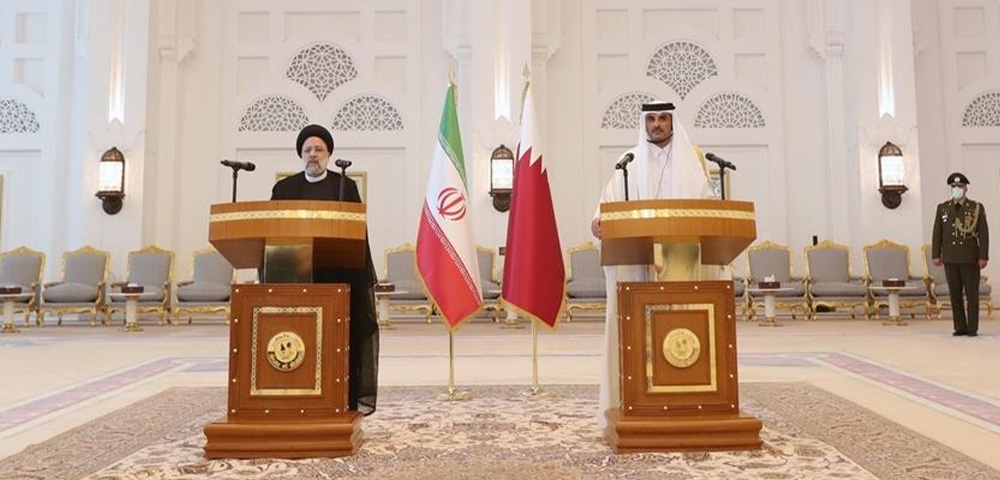
Then the two sides disagreed over Syria during the Arab Spring, as Iran supported Bashar al-Assad while Qatar supported the Syrian revolution. Qatar was the last country to support Saudi Arabia by recalling its ambassador to Tehran after the embassy incident in 2016.
After the blockade of Qatar by Saudi Arabia in 2017, Tehran opened its airspace to Doha and supported it in breaking the siege. Bilateral relations were restored, and in recent years, Qatar has played the role of mediator between Iran and the major powers in order to return to the nuclear agreement and reduce tensions in the region.
With the cessation of relations between the Islamic Republic and the West due to the nuclear file, Tehran's support for Moscow in its war against Ukraine, the missile program, human rights issues, and recent protests, it seems that the conservative government in Iran has turned to developing its relations with its neighbors to alleviate the pressure of economic sanctions that have exhausted the country.
Raseef22 is a not for profit entity. Our focus is on quality journalism. Every contribution to the NasRaseef membership goes directly towards journalism production. We stand independent, not accepting corporate sponsorships, sponsored content or political funding.
Support our mission to keep Raseef22 available to all readers by clicking here!
Interested in writing with us? Check our pitch process here!
